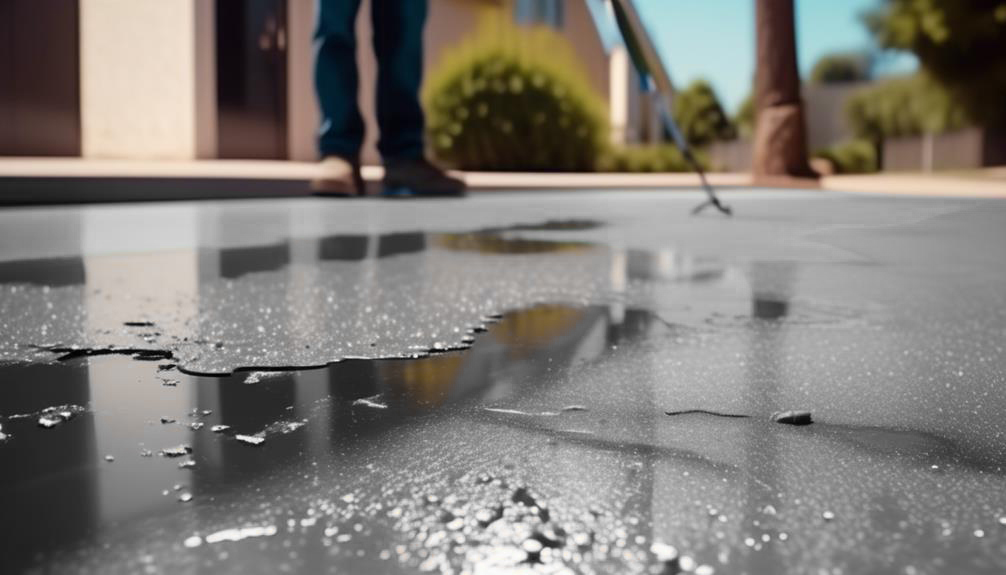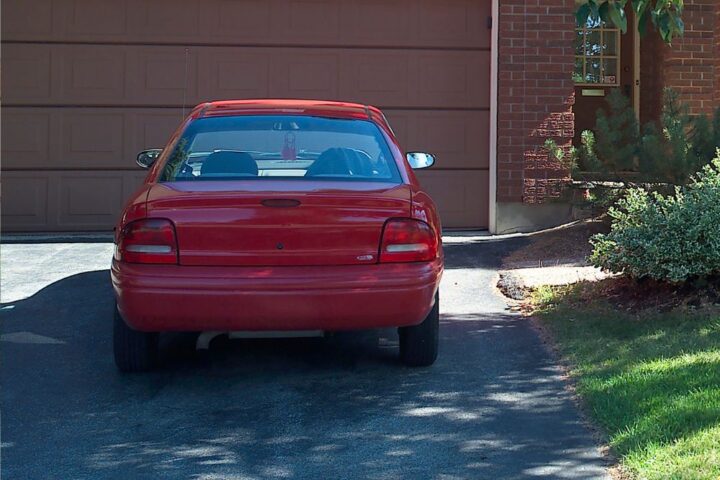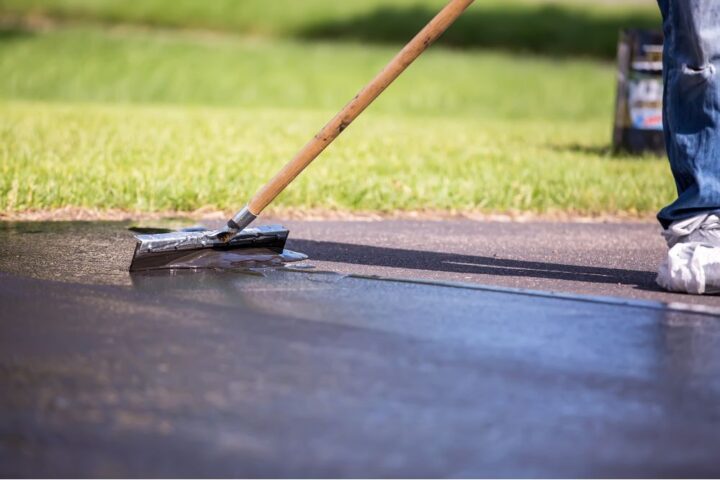In the sphere of driveway upkeep and enhancement, selecting a suitable sealer, such as epoxy coatings, is a crucial choice with broad-ranging implications. The decision not only influences the aesthetic allure of the property but also governs the durability and longevity of the driveway.
This guide aims to offer detailed insights into epoxy coatings, their advantages and potential disadvantages, their lifespan, and their comparison with other driveway sealers in the market.
By the end of this guide, the subtle nuances of driveway sealers will be laid bare, equipping you with the expertise to make a well-informed choice, thus ensuring the preservation of your driveway’s integrity for years to come.
What Is a Concrete Driveway Epoxy Coating?
An epoxy coating for concrete driveways, essentially a robust surface layer composed of epoxy resin and hardener, creates a seamless, glossy surface that effectively resists heavy traffic, oil stains, and water damage. It bonds well to its substrate, making it a favoured choice in commercial and industrial settings.
The cost of driveway epoxy can vary, depending primarily on the size of the surface to be covered in square metres, the type of epoxy used, and whether the application is done professionally or as a DIY project. The application process involves meticulously preparing the surface, applying the epoxy, and allowing plenty of drying time.
In terms of maintaining epoxy-coated driveways, regular cleaning with mild detergent and water is typically adequate. However, it is crucial to promptly address any stains or spills to prevent permanent damage.
While there are numerous epoxy options available in the market, the best ones are characterised by their durability, ease of application, and resistance to harsh elements. Lastly, while DIY installation may be cost-effective, professional installation guarantees a flawless finish and long-lasting performance. These factors should be carefully considered when opting for a driveway epoxy coating.
Benefits Of Epoxy Driveway Coatings
Upon investigating the nature and application of epoxy coatings for driveways, we now shift our focus to the numerous advantages such coatings provide, including improved safety, durability, aesthetic appeal, and simplicity of maintenance.
- Improved Safety: The application process of epoxy coatings creates a non-slip surface, considerably increasing the safety of your driveway.
- Durability: Epoxy driveway coatings are renowned for their durability and longevity, making them a cost-effective solution. They are robust against high traffic, weather extremes, and chemical spills, reducing the need for frequent replacements.
- Aesthetic Appeal: Epoxy coatings come in various popular colour options, allowing homeowners to personalise their driveways and enhance kerb appeal.
- Simplicity of Maintenance: Owing to their non-porous and antimicrobial properties, maintenance tips for epoxy coated driveways encompass straightforward sweeping and occasional washing.
While the DIY vs professional installation of epoxy coatings discussion continues, the precision and expertise of professionals often yield superior results. However, with proper instructions and quality materials, homeowners can also successfully apply these coatings. Ultimately, the decision depends on individual capabilities and preferences. Regardless of the choice, the benefits of epoxy driveway coatings are undeniable.
Are There Any Disadvantages to Epoxy Coatings?
Despite the numerous benefits of epoxy coatings for driveways, it’s essential to acknowledge and address certain potential drawbacks that may surface under specific conditions. One of the downsides is that hot slag and moisture can damage the epoxy-coated surface. Moreover, moisture vapour can delaminate the epoxy coating from the concrete, leading to an undesirable finish.
Leaks, drainage issues, and slabs below grade can also affect the coating, necessitating diligent maintenance to ensure a moisture-free driveway. Efflorescence, the white powdery substance that forms when the surface becomes damp, requires meticulous cleaning. Regular monitoring and maintenance, therefore, are vital, despite common misconceptions that epoxy coatings are maintenance-free.
Cost analysis also reveals that while epoxy coatings have long-term benefits, the initial outlay can be substantial, particularly for professional installation. DIY installation, although less expensive, may not provide the same level of durability and finish, leading to potential future costs.
How Long Does Epoxy Last On Driveways?
The durability of epoxy on driveways hinges on several factors that we will delve into in our conversation. These involve:
- The calibre of the original application
- The environmental conditions it is subjected to
- The maintenance practices employed
Each of these will have considerable influences on the lifespan of the epoxy coating on your driveway.
Factors That Affect Lifespan of Epoxy Coating
Several key factors significantly influence the lifespan of epoxy coatings on driveways. These factors include:
- Surface preparation and application techniques: The longevity of epoxy coatings can be greatly affected by these two factors. Proper preparation and application are fundamental for a durable finish.
- Environmental factors: Exposure to sunlight, dampness, and temperature variations can affect the lifespan of epoxy materials.
- Quality of epoxy materials: High-quality materials and thicker coatings generally last longer.
- Regular Maintenance: Regular cleaning and resealing can prolong the lifespan of epoxy coatings.
Driveway usage, particularly the level of vehicular traffic, also plays a crucial role in determining the durability of the epoxy coating.
Should You Epoxy Coat Your Driveway?
In pondering whether to epoxy coat your driveway, it is crucial to consider the numerous advantages this type of sealant offers, including enhanced safety, durability, aesthetic appeal, and suitability for high-traffic areas. Epoxy coatings not only create a non-slip, safe surface but also offer durability, extending the lifespan of your driveway. This coating’s aesthetic appeal is undeniable, with varied colour and design options adding to your property’s kerb appeal.
A key factor to take into account is the cost comparison between epoxy coating and other types of sealants. While epoxy might have a higher upfront cost, its longevity and low maintenance can lead to significant savings over time. You may choose to install the coating yourself or hire professionals. Nevertheless, professional installation ensures proper preparation of the driveway surface and application of the coating, leading to better performance and durability.
Maintenance of epoxy-coated driveways is relatively straightforward, thanks to their non-porous and antimicrobial properties. Regular cleaning and the avoidance of harsh chemicals will keep the surface in top condition.
Alternatives to Epoxy Coatings For Driveways
While epoxy coatings offer numerous benefits for driveways, there exist other viable alternatives such as silicon-based, polyurethane, and water-based acrylic sealants. These alternatives present different characteristics, making them suitable for various applications and environments.
- Silicone based options: Silicon-based sealants penetrate deep into the concrete, providing excellent protection from moisture and freeze-thaw cycles. They are ideal for regions with severe weather conditions.
- Polyurethane alternatives: Polyurethane sealants form a high-build, protective film on the concrete surface, offering superior abrasion and chemical resistance. They are perfect for high-traffic areas.
- Water based acrylic choices: Water-based acrylic sealants are eco-friendly options that provide good colour enhancement and gloss. They are best suited for decorative exterior applications.
- Comparing sealant characteristics: It is vital to compare the durability, penetration depth, resistance to elements, and cost-effectiveness of these alternatives to select the most suitable option.
Selecting the right sealant requires a careful evaluation of these factors. Consider the specific environment, desired aesthetic, and budget when choosing between epoxy, silicone, polyurethane, and acrylic sealants. Each has its strengths and drawbacks, so understanding these aspects will ensure you make an informed choice.
Frequently Asked Questions
What Is the Best Epoxy for Driveways?
The optimal epoxy for driveways strikes a balance between durability, cost in Australian dollars, and ease of application. Seasonal effects also play a part in the decision, with certain types of epoxy performing better in different climates. Considering these factors will help in choosing the best epoxy for your driveway.
Can You Epoxy Coat a Driveway?
Yes, you can apply an epoxy coating to a driveway. The benefits include durability and aesthetic attractiveness. The installation process may need professional assistance or DIY methods. Maintenance is minimal, and cost analysis suggests it’s a valuable investment.
How Long Does Epoxy Last on a Driveway?
The lifespan of epoxy on a driveway largely depends on the impact of weather conditions and maintenance. The life expectancy of epoxy can be significantly enhanced with suitable care, despite epoxy ageing. Regular maintenance is vital to withstand weather conditions and extend its durability.
Conclusion
In conclusion, comprehending the intricacies of driveway sealants, particularly epoxy coatings, is crucial for making informed decisions.
Epoxy coatings offer significant advantages, such as enhanced durability, stain resistance, and UV protection, contributing to the longevity of the driveway.
However, potential disadvantages necessitate careful consideration.
Alternative options exist, yet the quality of sealants directly impacts the durability of the driveway.
Hence, investing in premium sealants is a wise strategy for efficient driveway maintenance.




